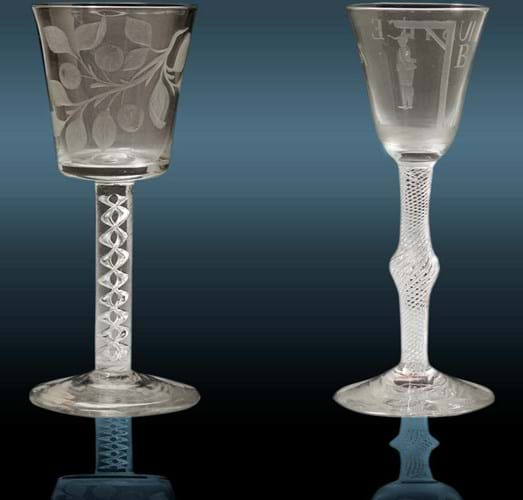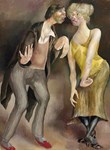
A 1755-60 large and rare cider glass was a reminder of the drink’s once elite status.
“From the late 17th century cider was a popular drink among the upper classes, many of whom had apple orchards,” said W&W expert Clare Durham.
The 6½in (17cm) tall glass, more rounded than an ale glass and engraved with a fruiting apple branch rather than hops, went to a collector at a triple-estimate £3800.
Two rather unusual commemoratives were also snapped up by collectors.
The first, a 6in (15cm) tall c.1763 air-twist wine glass, was engraved to one side of the rounded funnel bowl with an admiral hanging from a gibbet, and the initials AB (for Admiral Byng) and to the other with the word Justice.
The scene is symbolic – Byng was executed by firing squad on his own quarter deck – and the single word a sardonic reference to what was widely seen to be a grave injustice.
British scapegoat
It was after an inconclusive battle with the French in 1757 that Byng, who had tried to relieve the besieged British garrison on Minorca, returned to Gibraltar for much-needed repairs, supplies and fresh crewmen. Instead he was court-martialled, cleared of cowardice but found guilty of failing to do his utmost.
The court recommended clemency but the navy carried out the death penalty.
Today there is pretty much unanimous agreement that Byng was a scapegoat for the Admiralty’s inefficiency, and that Voltaire got it about right when Candide is told that in this country it is wise to kill an admiral from time to time “pour encourager les autres”.
Officially, however, Byng is still guilty and his descendants, notably Hampstead artist Thane Byng, continue to campaign to get the verdict overturned.
The glass was catalogued as extremely rare – one is in the National Trust’s Mompesson House near Salisbury, and Wiltshire specialist dealership Delomosne sold another recently from the Tughan Collection. Estimated at £1000-1500, the W&W glass sold at £2200.
Taking Liberty
The American War of Independence divided Britain to the same extent as the Byng case, as evidenced by a commemorative wine glass, engraved to the tapered tunnel bowl Liberty 1776.
The 6½in (17cm) glass had a plain stem and conical foot. Interest from the US pushed bidding beyond the £400-600 estimate but the glass went to an English collector at £3200.














